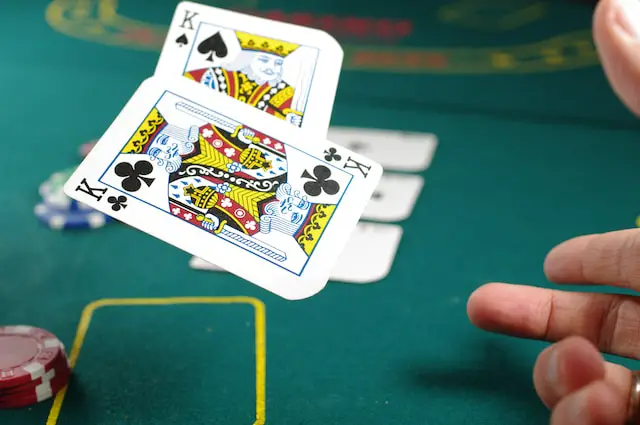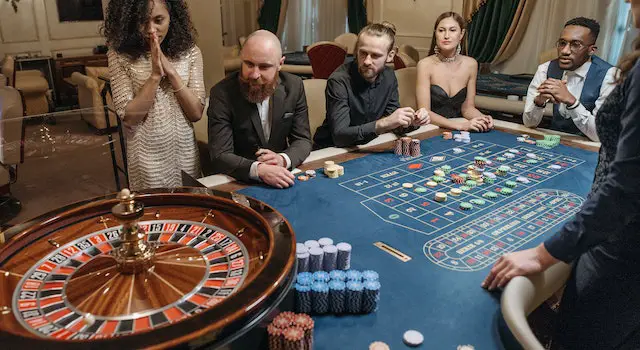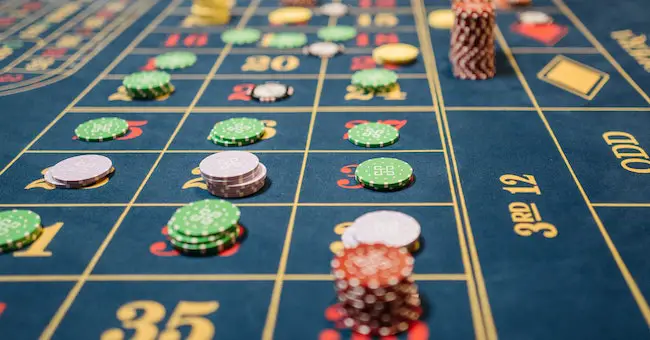How Much Do Poker Dealers Make In Tips?
No matter what kind of cash game a dealer is playing, he or she typically earns at least $10 an hour. Some high-stakes games allow players to make as much as fifty dollars an hour from tips.
Understanding The Tip Culture In Poker

In the poker world, an unspoken yet well-known practice is “tip culture.” Tipping refers to providing a small portion of your stake to dealers or other staff members involved in playing the game. While it’s not required, it is a common practice in various casinos and poker rooms around the globe. We will examine the tip customs in poker, their significance, and the rules accompanying the practice.
The Significance Of Tipping In Poker
Appreciation For Service
The desire to thank the dealer and other staff members for their assistance is one of the primary justifications for tipping during poker games. Dealers spend a lot of time managing the game, distributing cards, and ensuring fair play. When they are rewarded with a tip, the players appreciate their hard work and the benefit they add to the poker experience. This creates a friendly and respectful environment in the poker room, encouraging an atmosphere of camaraderie among players and the staff.
Enhancing The Playing Environment
Tipping can also play a part in improving the overall playing environment. Dealers count on tips to supplement their earnings, and by providing generous tips, they contribute to the lives of those working in the business. If dealers feel appreciated and properly compensated, they’re more likely to offer an excellent level of service, which results in the best poker experience for all players.
Superstition And Good Luck
It is not uncommon to see superstition in the world of poker. Many poker players think that tipping could result in luck. It’s not unusual for players to give a tip after winning a large pot or an important hand and attribute their winnings to the energy emitted through tipping. While the superstitions of each person are different and individual, the act of tipping could be used as an individual ritual that can bring luck and good vibes to ensure that the next hand is successful.
The Etiquette Of Tipping In Poker
Tip Amounts
The amount you should give in poker is usually an individual decision. However, it is advisable to follow some common rules. The standard practice is to leave a tip of 1–2% of every won pot. If, for example, you win $100, a tip of $1 to $2 is considered standard. Players might prefer to leave a bigger tip in bigger pots and high-stakes games. It is important to be aware of your money and keep tips in a way that is within your budget.
Timeliness Of Tipping
When it comes to the timing of tipping, it is essential. The rule of thumb is to tip immediately after winning the pot. This lets the dealer get their money promptly and allows the game to continue smoothly. In the event of a delay or a failure to tip, it could be seen as rude or unprofessional. Be aware that tipping is a sign of appreciation, and prompt tipping displays respect for the role of the dealer within the sport.
Tipping Non-Dealers
Although dealers are the main recipients of tips, it is important to note that staff members, such as floor managers, chip runners, or cocktail waitresses, help enhance the poker experience. Some players prefer to pay them, particularly if they’ve given outstanding service. Tipping non-dealers isn’t as usual, but it can be a means of acknowledging the whole team’s hard work.
Tipping in Tournaments
In tournaments, the dynamics of tipping could be different. Instead of tipping a percentage of the winning pot, tournament players typically set aside their tips for specific points, like getting to the table at the end or winning during the tournament. The custom is to leave an amount equal to the winnings or a predetermined amount based on the buy-in amount and the difficulty of the competition. Tipping during tournaments is not mandatory, but it is highly appreciated and considered a sign of respect for the sport.
Factors Affecting Poker Dealer Tips

In casinos, paying the dealer a tip is standard procedure. It’s a way to show gratitude for the dealer’s service and acknowledge their part in providing an enjoyable and fair playing experience. Tipping is not required, but it is influenced by a number of factors that may have a significant impact on the tips a dealer gives. We will look at six important factors that influence tips from poker dealers.
Player’s Winning or Losing Streak
One of the biggest factors that affects tips for poker dealers is the streak of the player’s wins or losses. If players are enjoying a winning streak and are winning, they tend to be more positive and are more likely to tip generously. Winners might attribute their success to the skill of the dealer or their enthusiasm, which leads them to express their gratitude by giving higher tips. On the other hand, those who are losing may be more upset or dissatisfied, which may result in less or no tipping for dealers. The player’s emotional state and perception of the impact of the dealer on their outcomes can greatly influence their tipping behavior.
Furthermore, the size of losses or wins can influence the tipping amount. If a player has made a significant amount of money, they might be more compelled to share their accomplishments with the dealer, while those who have suffered a significant amount of money may be more reluctant to give tips or give more money. So, the player’s performance and financial position during the game will directly relate to how many tips the dealer receives.
Table Stakes and Buy-Ins
Buy-ins, as well as the stakes that are offered at the table at poker, can affect the tipping habits of players. When playing high-stakes games where players bet huge amounts of money, the potential for higher tips could be greater. The players might feel pressured to give more generous tips when they are likely to win a lot, especially when they believe that a favorable rapport with the dealer can be a source of luck or favoritism. However, tips can be low when playing at tables with lower stakes, where buy-ins are lower. The financial environment of the game could impact players’ perceptions about what constitutes a proper amount to tip.
Dealer’s Performance and Personality
The quality of the dealer’s work and character are crucial in determining how many tips they are given. A competent and effective dealer who has an optimistic attitude, creates an inviting environment, and can communicate with players is more likely to be recognized with more tips. The players appreciate dealers who manage the game effortlessly, can accurately manage chips and cards, and display excellent customer service abilities. Dealers who engage in pleasant chatter, demonstrate enthusiasm for the game, and offer an overall pleasant experience are likelier to get more tips. Dealers who make frequent errors, are rude or hostile, or exhibit an absence of professionalism could get fewer tips or none at all.
Player’s Perception of Fairness
The perception of fairness may significantly affect tipping behavior. The players who consider the game fair, without any suspicion of bribery or favoritism, are likelier to give generous tips. The dealer’s role in ensuring fair play is played and enforcing the rules is crucial in encouraging this belief. Players admire dealers for being neutral and unbiased, making correct judgments, and efficiently managing conflicts or disputes. Dealers perceived as fair and impartial in their choices can be recognized with more tips. In contrast, if the players feel that the dealer isn’t playing the game fairly and are not satisfied with the outcome, they can refuse to give tips as a sign of protest or voice their displeasure in different ways.
Unveiling The Range: How Much Do Poker Dealers Make In Tips?

Dealers are crucial in making the game enjoyable and ensuring a smooth and enjoyable player experience. While they earn basic pay from the casino, a large proportion of their earnings come from tips. The rules for tipping vary between casinos and locations, but understanding the various income streams can give insight into a poker dealer’s income potential. We will examine the variables that determine what kind of tip poker dealers offer and look into the various profits they can anticipate.
Casino Policies and Tipping Culture
The policies and practices regarding tipping within a particular casino significantly impact how much poker dealers make in tips. Certain casinos have strict rules concerning tipping, like the requirement that dealers collect their tips in a pool and then distribute them equally to all dealers on shift. In these cases, the amount each dealer is paid may be more consistent, but it could also be lower, depending on the number of tips collected and the number of dealers working.
On the other hand, casinos that allow individual tipping give dealers a chance to get higher-quality tips depending on their performance and interactions with customers. In these establishments, a competent and friendly dealer will build relationships with the players, increasing the chances of receiving significant tips. The culture of tipping in the casino and the freedom granted to dealers when accepting tips directly affect the profits they can earn.
Game Stakes and Player Behavior
The stakes of a poker game and the players’ conduct have a major impact on the amount of money that poker dealers earn in tips. When games are high-stakes and large sums of money are bet, players can be expected to tip more generously. The potential for winnings, as well as the greater financial capability of the players, can result in larger tips for dealers.
In addition, the conduct and attitude of players may affect the tipping. Respectful and courteous players give generously, recognizing the dealer’s effort and knowledge. However, aggressive or rude players might not offer or withhold lesser tips. The variety of profits for dealers in poker depends on the general dynamics at the table, as influenced by stakes and player behavior.
Skill, Efficiency, And Customer Service
In poker, a dealer’s effectiveness, skill, and level of customer service directly influence how much tip money they receive. Dealers who are proficient in managing their game, skilled in shuffling cards and dealing with them, and well-versed in game rules and variations will receive more tips. Players admire dealers for their ability to ensure that the game runs without a hitch while being fair and accurate.
Efficiency is another aspect that affects tipping. Dealers who manage cash and chips efficiently by minimizing interruptions and delays are likelier to receive greater tips. Also, providing exceptional customer service by being pleasant, engaging, and attentive to the players’ needs improves overall satisfaction. Dealers who foster an enjoyable and positive atmosphere will likely earn greater tips.
Relationship Building And Personal Interactions
Making positive connections and having personal interactions with players could greatly influence the number of tips poker dealers receive. Dealers who take the time to keep track of players’ names, preferences, and particular playing styles create a sense of connection and familiarity. People appreciate this attention to detail and will be more likely to show gratitude by leaving generous tips.
Establishing a relationship with players requires creating a welcoming and comfortable atmosphere in the room. Dealers who promote a welcoming environment, encouraging conversations and camaraderie between players, are more likely to earn greater tips. By establishing a good relationship with players, dealers boost their chances of gaining more substantial tips.
The Dark Side: Challenges Faced By Poker Dealers

Although being a dealer in the game can be thrilling and rewarding, it also has many problems. Dealers of poker are accountable for overseeing the game, applying rules, and providing an enjoyable and fair gaming experience for players. But they are often faced with many challenges that impact their health and satisfaction at work. We will examine poker dealers’ difficulties and illuminate the profession’s dark aspects.
Demanding Work Environment
Being a dealer can be mentally and physically stressful. Dealers frequently work long hours standing or seated in one place without breaks, leading to physical fatigue and discomfort. The continuous focus and concentration required to play, handle chips and cards, and do quick calculations can be mentally exhausting. Additionally, the speedy game of poker, especially in high-stakes situations, can add to the stress and pressure experienced by dealers.
Dealers have to remain professional and calm even in difficult situations, like dealing with difficult players or resolving disputes. Handling demanding and disruptive players can put a strain on the emotional health of the dealer. The combination of physical, emotional, and mental pressures in the working environment makes it a huge problem for dealers in poker.
How To Deal With Difficult Players?
One of the biggest issues dealers in the field confront is dealing with difficult players. While most players are polite, there are occasions when they may be rude or even disrespectful to the dealer. They may also accuse the dealer of their loss, make unreasonable demands, and create a negative environment in the room. These behaviors not only harm the dealer’s satisfaction but also increase the general tension and stress around the table.
Dealers must deal with difficult clients professionally and stay calm and cool while resolving tense situations. But dealing with adversaries can drain you emotionally and affect the dealer’s attitude. Maintaining a calm and composed attitude and delivering exceptional customer service when confronting challenges is a trait that poker players need to master to be able to face this issue.
Inconsistent Income and Financial Instability
While tips make up a substantial part of a dealer’s revenue, they are also irregular and unpredictable. Tips collected will vary greatly based on factors like the game’s stakes, the players’ behavior, and the culture of tipping in the casino. Dealers can see fluctuations in their earnings during shifts, making it difficult to budget and plan their budgets efficiently.
Furthermore, during periods of slowness or when casinos are less busy, there could be fewer customers and, therefore, fewer tips. This could lead to an unstable financial situation for dealers, particularly those who rely on the tips they receive. The uncertainty around the source of income and financial instability is a constant issue for poker dealers.
Monotonous and Repetitive Nature of the Job
While poker is thrilling, a poker dealer’s job can be monotonous and repetitive over time. Dealers could be faced with the same players, using the same rules, dealing with various players, and interacting with the same situations regularly. This constant repetition could result in boredom and a lack of enthusiasm, which could affect the satisfaction of the dealer’s job.
Furthermore, the need to maintain exactness and accuracy in dealing with chips and cards could become routine and lose its originality. Dealers need to remain alert and focused throughout long hours of constant gaming. The monotony of their job can cause mental exhaustion and make it hard for dealers to stay focused.
FAQ’s
How much do poker dealers typically make in tips?
The amount poker dealers make in tips can vary depending on factors such as the stakes being played, the location of the casino, and the generosity of the players. On average, poker dealers can expect to make around $20 to $30 per hour in tips.
Do poker dealers receive a base salary in addition to tips?
Yes, poker dealers typically receive a base salary in addition to tips. The base salary can vary depending on the casino and the dealer’s experience. However, the majority of a poker dealer’s earnings come from tips.
Are tips pooled among all the poker dealers or kept individually?
This can vary from casino to casino. Some establishments pool all the tips received from poker games and distribute them equally among all the dealers working that shift. Other casinos allow dealers to keep their individual tips, which means their earnings are based solely on their own performance.
Do poker dealers receive tips from every pot or only when a player wins?
Poker dealers typically receive tips when a player wins a pot. In most cases, players will voluntarily give a tip to the dealer after a significant win or a particularly enjoyable game. However, it is not mandatory, and some players may choose not to tip.
Are there any specific tipping etiquette or customs for poker dealers?
While tipping customs may vary, it is generally considered customary to tip poker dealers around 1 to 5% of the pot size when a player wins a hand. Some players may also choose to tip a fixed amount at the end of a session or give extra for exceptional service.
Do high-stakes games result in higher tips for poker dealers?
Yes, high-stakes games often lead to higher tips for poker dealers. In these games, the pot sizes are typically larger, and players may be more inclined to give larger tips to show their appreciation for the dealer’s skill and professionalism.
















